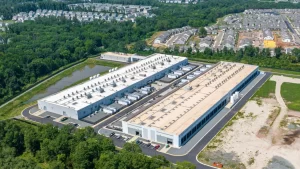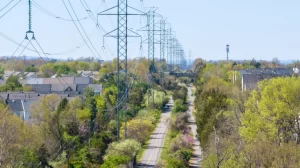The environmental campaigners fighting against data centres
3 min read
Julie Bolthouse is opposing new data centre planning applications in Northern Virginia. BBC

Julie Bolthouse is opposing new data centre planning applications in Northern Virginia. BBC
Environmental campaigner Julie Bolthouse is deeply concerned about the rapid expansion of data centers in Northern Virginia, which is home to the world’s largest concentration of these facilities. As the director of the Piedmont Environmental Council, a local charity and advocacy group, she likens the region to the “Wall Street of the data center industry.”
Data centers are essentially large warehouses filled with computers that store and process data for websites, companies, and governments. Since the 1990s, Northern Virginia has become a prime location for these centers, benefiting from its proximity to Washington, D.C., as well as historically low electricity and land costs.
Centered around Ashburn, located 35 miles west of the U.S. capital, Northern Virginia boasts over 477 data centers, far surpassing Texas and California, which have 290 and 283, respectively. Some estimates suggest that about 70% of the world’s internet traffic flows through Ashburn and its neighboring areas, collectively referred to as “Data Center Alley.” The increasing demand for data centers is driven by the growing need for computing power, particularly due to advancements in artificial intelligence (AI). A recent study by Moody’s projects that global data center capacity will double in the next five years.
Bolthouse and fellow environmentalists are opposing the ongoing expansion of data centers in their area, citing significant negative impacts on their quality of life. She highlights concerns such as new electricity cables being laid across conservation lands and neighborhoods, rising water demands, and the emissions from backup diesel generators, which worsen air quality. Additionally, local residents in Virginia and Maryland are expected to shoulder the costs of upgrading the electricity grid required by these facilities.

In response, Bolthouse and her team are actively campaigning against each new data center application, advocating for changes at the local and state levels to educate planning commissions and supervisors about the issues at hand. Similar movements are emerging globally, including in Ireland, where data centers consume 21% of the country’s electricity.
Tony Lowes of Friends of the Irish Environment emphasizes that their objections to data centers are rooted in concerns about climate impact, sustainability, and strain on local infrastructure. He points out that reliance on fossil fuels can jeopardize renewable energy goals. The group is currently challenging plans for a new €1.2 billion ($1.3 billion) data center in County Clare, calling for a halt to new developments unless they prioritize renewable energy and implement energy-efficient measures.
In an effort to address these concerns, major players in the data center industry are making commitments to sustainability. For example, Microsoft announced its Data Center Community Pledge, aiming to procure 100% renewable energy by next year and achieve zero waste and water positivity by 2030. Similarly, Amazon Web Services (AWS) has implemented recycled water cooling systems in many of its facilities and aims for water positivity by the same year.
Josh Levi, president of the Data Center Coalition, which includes major operators like Amazon, Google, and Microsoft, argues that the industry is leading the way in clean energy adoption. He notes that data center providers accounted for two-thirds of the corporate renewables market in the U.S. last year, highlighting their role in driving energy efficiency across various sectors.

Protests against data centers have also gained momentum in South America. In Uruguay, campaigners successfully pressured Google to alter the cooling system of a facility under construction from water-cooled to air-cooled, amid concerns about water scarcity. María Selva Ortiz from Friends of the Earth Uruguay stated that the original proposal would have consumed water equivalent to the daily needs of 55,000 people.
In Chile, Google halted plans for a new data center due to similar water usage concerns. Back in Virginia, Bolthouse remains hopeful that the data center industry will eventually prioritize sustainability. She warns that without significant changes, rising electricity prices and water scarcity will affect both residents and the industry itself.
In summary, while the data center sector continues to grow, so too does the opposition from environmental advocates, urging for more responsible and sustainable practices to protect local communities and ecosystems.